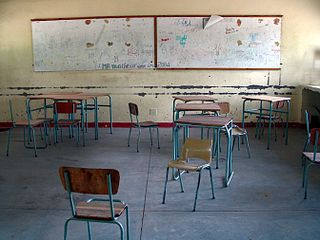
Namibia, officially the Republic of Namibia, is a country in Southern Africa. Its western border is the Atlantic Ocean; it shares land borders with Zambia and Angola to the north, Botswana to the east and South Africa to the south and east. Although it does not border Zimbabwe, less than 200 metres of the Zambezi River separates the two countries. Namibia gained independence from South Africa on 21 March 1990, following the Namibian War of Independence. Its capital and largest city is Windhoek. Namibia is a member state of the United Nations (UN), the Southern African Development Community (SADC), the African Union (AU), and the Commonwealth of Nations.

The economy of Namibia has a modern market sector, which produces most of the country's wealth, and a traditional subsistence sector. Although the majority of the population engages in subsistence agriculture and herding, Namibia has more than 200,000 skilled workers and a considerable number of well-trained professionals and managerials.

Namibia follows a largely independent foreign policy, with strong affiliations with states that aided the independence struggle, including Libya and Cuba.

South West Africa was the name for modern-day Namibia when it was under South African administration, from 1915 to 1990.

Windhoek is the capital and largest city of Namibia. It is located in central Namibia in the Khomas Highland plateau area, at around 1,700 metres (5,600 ft) above sea level, almost exactly at the country's geographical centre. The population of Windhoek in 2020 was 431,000 which is growing continually due to an influx from all over Namibia.

The South West Africa People’s Organisation (SWAPO), officially known as SWAPO Party of Namibia, is a political party and former independence movement in Namibia. It has been the governing party in Namibia since the country achieved independence in 1990. The party continues to be dominated in number and influence by the Ovambo ethnic group.

Air Namibia (Pty) Limited, which trades as Air Namibia, is the national airline of Namibia, headquartered in the country’s capital, Windhoek. It operates scheduled domestic, regional, and international passenger and cargo services, having its international hub in Windhoek Hosea Kutako International Airport and a domestic hub at the smaller Windhoek Eros Airport.

Hifikepunye Lucas Pohamba is a Namibian politician who served as the second President of Namibia from 21 March 2005 to 21 March 2015. He won the 2004 election overwhelmingly as the candidate of SWAPO, the ruling party, and was reelected in 2009. Pohamba was the president of SWAPO from 2007 until his retirement in 2015. He is a recipient of the Ibrahim Prize.
The Namibian is the largest daily newspaper in Namibia. It is published in English and a section in Oshiwambo on Fridays.

Parliament is the law-making body of Namibia's legislature. It consists of two chambers:
- The National Assembly initiates and approves laws. It consists of 104 members, 96 of which are elected by parliamentary election. The other eight are appointed by the president.
- The National Council advises the National Assembly on any required changes to subordinate laws that result from law-making in the National Assembly. It can be tasked by the National Assembly to perform other tasks. The National Council consists of 42 representatives of the Regional Councils; every Regional Council in the fourteen regions of Namibia elects three representatives.

Namibia University of Science and Technology (NUST), formerly known as Polytechnic of Namibia, is an institute of tertiary education in the city of Windhoek, Namibia. It was until March 2019 headed by the founding vice-chancellor Tjama Tjivikua. The largely ceremonial role of chancellor of the university is held by Prof. Peter Katjavivi.
Religion in Namibia is dominated by Christianity, with more than 90 percent of Namibian citizens identifying themselves as Christian. According to the United States DRL, in 2007 up to 75% were Protestant, including as much as 50% Lutheran.

People's Republic of China–Namibia relations refer to the bilateral relations between the People's Republic of China and the Republic of Namibia. Governmental relations were first established the day after Namibia's independence, but relations with Namibian independence movements date back to the 1960s.

Education in Namibia is compulsory for 10 years between the ages of 6 and 16. There are approximately 1900 schools in Namibia of which 100 are privately owned. Namibian subjects' syllabi are based on the International General Certificate of Secondary Education which is part of Cambridge International. The Constitution directs the government to provide free primary education; however, families must pay fees for uniforms, stationery, books, hostels, and school improvements.

The Government of Namibia consists of the executive, the legislative and the judiciary branches. The Cabinet is the executive organ of government, implementing the laws of the country. It consists of the President, the Prime Minister and his deputy, as well as the Ministers. The legislative organs of government are the National Council and the National Assembly. They make the laws of the country. The judiciary organs of government are the courts. The highest court of Namibia is the Supreme Court. There is also the High Court, and lower courts.

The Namibia national cricket team is the team that represents the Republic of Namibia and is governed by Cricket Namibia, an Associate Member of the International Cricket Council (ICC) since 1992, and became part of the High Performance Program in 2007. They took part in the 2003 Cricket World Cup in South Africa, though they lost all their games. They have played in each edition of the ICC Intercontinental Cup.

Namibia competed at the 2012 Summer Olympics in London, United Kingdom from July 27 to August 12, 2012. This was the nation's sixth consecutive appearance at the Olympics.

Namibian nationality law regulates who is or may become a citizen of Namibia. The primary source of nationality law in Namibia is Article 4 of the Constitution of Namibia, with additional provisions provided by the Namibian Citizenship Act of 1990.
The 2019–20 coronavirus pandemic spread to Namibia, with the first confirmed cases announced on 14 March 2020 by Namibian Minister of Health and Social Services Kalumbi Shangula.













